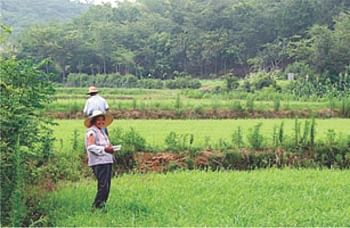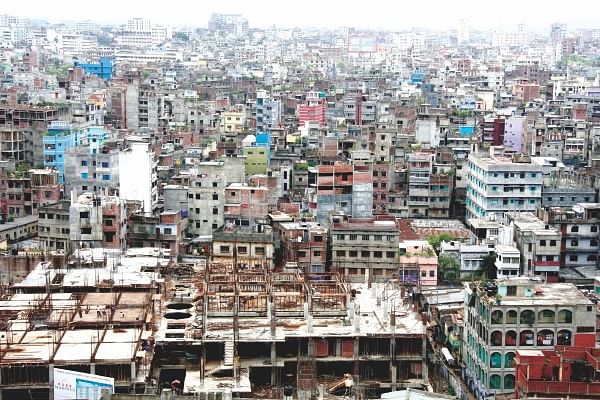| Home - Back Issues - The Team - Contact Us |
 |
| Volume 10 |Issue 39 | October 14, 2011 | |
|
|
Impressions Slow us Down Lord! Syed Maqsud Jamil
Rui Hongxing of China has gone back home. He is back in his little hometown of Yaxi. He wants to slow down. That is why he has left the booming city of Nanjing. For him Nanjing was too noisy, the pace was fast and there was no natural beauty. Attitudes are starting to change in China. There is a growing unease over tainted food, worsening pollution and the trials of urban living. Like him Zhuang Qingquan has also relocated to Yaxi. He does not like being around so many people. In Yaxi he finds harmony with the mountains, water and earth. Last year Cittaslow International an organisation that promotes sustainable urban life has designated Yaxi as China's first slow city. Yaxi a town of 20,000 people can be a model for China, a country of 1.5 billion people. There are 130 towns in 24 countries certified as Slow Cities. A candidate town must be small with a population of 50,000 or less, devoted to sustainability and improving resident's quality of life, and is expected to combat pollution, practice organic farming, promote local crafts and encourage eco-friendly development. China has a large population but is a big country. It is not easy in Bangladesh a small country with a large population of over 160 million. The population density is among the highest in the world. The pressure is on Dhaka a city bursting at the seams with a large population of over 12 million people. Dhaka has reached beyond Gazipur and is not far from Manikganj and Sonargaon. Bangladesh as a country has one of the highest urbanisation rate in the world. Forecasters observe that within the next 60-70 years the whole of Bangladesh will become an urban settlement. The decline of agricultural land is already a matter of concern. Migrant workers from all over the country keep on coming to Dhaka. The capital is in a distressing situation. Traffic jams are choking the city. The rush is a daily headache for the city dwellers. A large number of miscellaneous vehicles and people crowd the Dhaka roads. The speed is palpable. Unending streams of pedestrians walk in every direction of their own choice. They are all busy. If a system must have sanity in order to work, the city does not have a system. Environmental protection is high on the agenda but it does not have a bite. Factories and bazaars capriciously dump their waste products and leftovers on the road to fester. Effluents from industries are channeled into the river or water body so that compliance of rules does not slow them down. Unabated greed of the unscrupulously rich encroaches the rivers and fills up the water bodies and wetlands. The city ends up with polluted rivers, shrinking and lost water bodies and wetlands. The ills are only worsening.
There was a time when people rated Chittagong higher than Dhaka in terms of liveability. It has an idyllic natural landscape; the sea is nearby and the green hillocks dot the background. Now, it is now a beleaguered city. Large number of factories and industries are located in and around Chittagong. One presumes they are not as dutiful as they should be about keeping the environment clean. Chittagong therefore is to a larger extent a polluted city. Rampant hill cutting is putting the city under threat. The natural terrain of the city has been disrupted. Landslide and water logging are the major environmental concerns of Chittagong. The blighters are focused on the easiest and quickest way; no matter what they do to the picturesque landscape of the port city. There are no grounds to believe that the other divisional cities do not raise any concern because Bangladesh is a small country and examples travel fast. As it appears they are far from being picture perfect and are noisy, dirty and crowded. Attitudes are no different in district towns. Harmony in natural beauty for the cities and towns of Bangladesh is a textbook dream. There is wholesale use of chemical fertilizer and pesticides in the agricultural lands of Bangladesh. The residue is leaching out to canals and water bodies resulting in contamination harmful to aquatic life. Organic farming or use of compost is a thing of the past. While talking of sustainable urban living in Bangladesh even an optimist will demur when life in the country is reeling under spiraling cost of living. They do not offer what Rui Hongxing and Zhuang Qingquan sought in returning to their hometown Yaxi. Slowing down and sleepy small towns are not on the agenda nor is it a priority with the government. Our government is more preoccupied with high profile infrastructure development and of reaching two digit growth rate as quickly as possible. The government quickly wants to add muscle to its litany of successes before the next national poll. And also to institutionalize the founder of the country Bangabandhu Sheikh Mujibur Rahman. Understandably they are much keen at proceeding at great speed. We are hearing of two Padma bridges, another on Meghna, flyovers, elevated expressway and metro rail in Dhaka. The most grandiose of all is a new international airport at Char Janajat of Shibchar, Faridpur. The new airport at Char Janajat or at any other site will take away possible agricultural land, displace homesteaders and fill up water bodies that act as flood protection. Experts have already observed that Bangladesh does not need a new international airport when the existing Hazrat Shah Jalal (RA) airport can be extended to meet future rise in air traffic. There is little talk about sustainable development of villages and small towns. Professor Yunus did a wonderful job of making small beautiful with his microfinance. Upstream withdrawal of water by India has made Bangladesh a water deficient country. There was a time when a leader campaigned for restoring our canals and water bodies for storing water. The motivation content in it was good. It envisioned a self-reliant and sustainable small community free of government handouts. We have always prided ourselves as a riverine country. The campaign spoke of fish cultivation in the canals and water bodies, raising chicken and ducks, building vegetable gardens, planting fruit trees and returning to local cottage crafts. Infrastructure development has definite benefits but it also means pell-mell urbanisation. Grandiose plans can therefore create grim human realities on the ground. Bangladesh will have to contain the rush to Dhaka and other cities and keep people to their places where they can be of worth and where they belong. It can surely have small, sustainable, environmentally clean and quiet towns and villages. That will be Sonar Bangla. For that to materialise slow us down Lord!
Copyright (R) thedailystar.net 2011 |
||||

